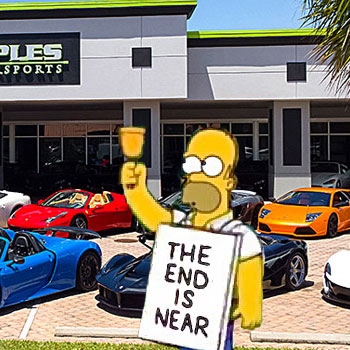Fully-automated driving will kill the sports car as we know it. Beyond the structural elements (two seats, light construction, aerodynamic styling), the point of the sports car is that the driver interacts directly with the vehicle and the road it’s on. When the driver is not controlling the movement of the car, he/she becomes a passenger, and in the fully-automated driving context, a passenger with no real concern for the road. By the spirit of the original definition, a self-driving sports car is no longer a sports car.
I believe I’m late to this realisation, unlike the sports car manufacturers. Other than the true exotics, there are no pure sports car brands remaining—even Porsche is selling the majority of their units in non-sports car form. Was this trend all about making money, or was it precognition? Both, I think.
There may have been a bit of forestalling destiny on the part of sports car brands. Porsche and others knew for years that advanced automatic transmissions shifted faster than the best human could, but not until the mid-2000s did they start identifying this in model specs by showing different acceleration numbers for the two transmission types. It still sells a manual transmission in about 20% of its sports cars, but I’m surprised the proportion is that high.
When will the end of the sports car be? Much like predicting the end of the world, there are a number of opinions, and the answers need to be qualified by the way the fully-automated driving question is asked:
“Never” – Wired, Apr 8, 2018. Except the question was, “When will self-driving cars be ready?”, and the answer is ‘never’ because it will be a constant work-in-progress.
“2040” – Fortune, Sep 13, 2017. The question was, “When will having a self-driving car be a normal thing?” and the complete answer was, “Self-driving cars won’t hit our roads in a noticeable way until 2020. But by 2040, we estimate that 95% of new vehicles sold … will be fully autonomous.” So this timing depends on your numeric definition of ‘normal’.
“Two years” – Elon Musk, at a 2017 TED conference. The question was, “How far away are we from sleeping in our cars while they drive themselves?”. Two years means 2019. Okay, Elon, people who can’t afford your cars have been sleeping in theirs for some time now, though not while they are moving [2].
We’re certainly on our way with today’s cars. They’ve been able to parallel park themselves for years now. We have all kinds of braking intervention. Speed control now monitors following distance in traffic. Then there’s lane departure warning.
 In-vehicle technology is now as important in the consumer’s purchase decision as brand and model[3]. This isn’t technology relating to old-school things like engine performance or road handling, it’s USB ports, WIFI and Internet connectivity, voice and gesture command input, mobile app and smartphone connectivity and infotainment systems.
In-vehicle technology is now as important in the consumer’s purchase decision as brand and model[3]. This isn’t technology relating to old-school things like engine performance or road handling, it’s USB ports, WIFI and Internet connectivity, voice and gesture command input, mobile app and smartphone connectivity and infotainment systems.
Yes, the end of the sports car is nigh. It’s a sad thing to the nostalgic (like me) but the death of the sports car is necessary collateral damage in the saving of people. In North America alone, almost 45,000 die in vehicle accidents every year. Worldwide, it’s over a million. Removing human error saves 90% of those lives.
The well-heeled and nostalgic will be able to drive their vintage, air-cooled, six-speed 911s at specially-designated tracks in the near countryside. Even today, that’s the only place you can legally drive a sports car anywhere near its limits.
- Main image credit: ©Richard Wanderman, 2014. This is a rare scene—70% of all Porsches ever made are still road-worthy.
- To be fair to Mr Musk, he was responding to someone else’s question and made it clear he was not talking about 100% automated perfection, so maybe you wouldn’t want to sleep after all. Maybe it wasn’t a very good answer.
- Autotrader Car Tech Impact Study, 2017.
- Homer Simpson image is ©Fox Broadcasting Company.






Here’s Porsche’s answer to this, as reported by Porsche North America CEO Klaus Zellmer just a few hours ago:
https://driving.ca/porsche/auto-news/news/porsche-na-ceo-says-automaker-will-never-build-a-fully-autonomous-car